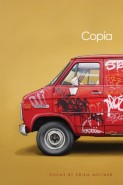
Book Review: Copia by Erika Meitner
Copia
Poems by Erika Meitner
BOA Editions, September 2014
ISBN-13: 978-1938160462
$16.00; 104pp.
Reviewed by Danny Caine
Erika Meitner’s fourth collection Copia takes its title from photographer Brian Ulrich’s project of the same name in which he documents retail stores, thrift stores, and empty stores or “ghostboxes” to chronicle suburban consumerism as it fades. Meitner takes up the same mantle, frequently populating rundown or empty generic sites with human desire and longing. The funny “Wal★Mart Supercenter” is a litany of true-crime anecdotes that all share the same big-box setting. In “Big Box Encounter,” Walmart becomes a site for a charged chance rendezvous:
I ran into him at Walmart buying tiki torches and margarita mix
and, flustered, I studied the white floor tiles, the blue plastic
shopping cart handle, while he told me something that turned
to white noise and I tried not to look at his beautiful terrible chest,
the V-shaped wings of his chiseled hipbones.
Throughout Copia, Meitner dazzlingly juxtaposes the fluorescent with the organic, the plastic with the fleshy. Even the most sterile and lifeless setting is ripe for Meitner’s sense of organic desire and feeling.
While big box retail is one preoccupation of postindustrial photographers, Detroit is another. Meitner devotes much of Copia’s third section to the crumbling city. Yet so many artists have succumbed to the temptation of creating “ruin porn,” wherein they direct the gaze of the fortunate onto the gaze of the less so. Meitner for the most part avoids such gawking, as demonstrated in her stirring Detroit poem “And After the Ark.” In it, Meitner does not ignore the troubles that befall the city, all the while finding something human and persistent among the ruins:
and all the factories of the great city burst apart
and all the floodgates of the sky broke open
and the schools and jobs were blotted out
but day and night did not cease
and all the flesh that stirred in the city persisted
Again, Meitner’s work is most stunning when human feeling emerges from sterile environments, whether the plastic-filled Walmart or the smoking ruins of a post-industrial Detroit.
Meitner’s debt to photographers is evident throughout Copia. Much of this collection boasts sharp and evocative imagery, both in the Detroit and Wal-Mart poems, as well as in the “Niagra” progression, inspired by Alec Sloth’s photography project of the same name. In Copia, Meitner herself acts as a kind of documentary poem-photographer, projecting human stories onto spaces and images we usually (and carelessly) call “dead” or “empty.” No matter how “dead” or “empty” the photograph, we still feel the presence of the one behind the lens.
Copia shares a different kind of beauty with the work of photographers: the book itself. The book’s size, ostensibly due to Meiter’s pleasantly meandering long lines, makes it an object to hold and behold, much like a book of photos. Fittingly, Copia begins with a meditation on object-ness. Its first poem, “Litany of Our Radical Engagement with the Material World,” explores our varied relationship with the “Objects around us.” Meitner writes that “Objects around us are Oh my God,” that “Objects around us are durable,” that “Objects around us are no substitute for anything.” Meitner concludes the poem with lines one could call Copia’s summary, manifesto, and invitation:
Objects around us dismantle the city.
The doors are wide open. Go in.
Danny Caine’s poetry has appeared or is forthcoming in New Ohio Review, Minnesota Review, Atticus Review, and Queen Mob’s Teahouse, among others. His reviews have appeared on Behind the Lines Poetry. Assistant managing editor of Beecher’s, he lives in Lawrence, KS and hails from Cleveland. dannycaine.com

